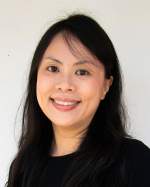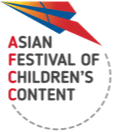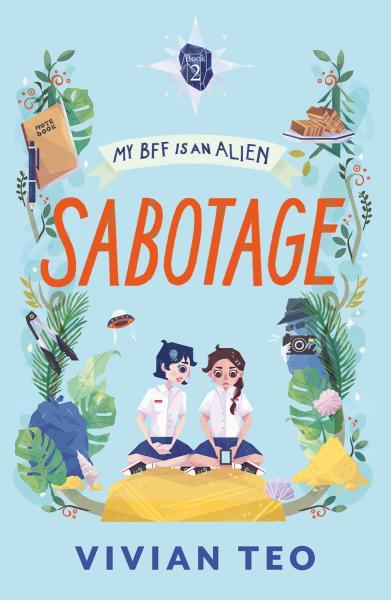My BFF is an Alien: Sabotage
By Vivian Teo
In the sequel to My BFF Is an Alien, best friends Abri and Octavia reunite and embark on a new adventure─in cyberspace. Octavia keeps her promise to Abriana and returns to Singapore. She’s accompanied by the trusted General Bin who’s tasked to ensure that Octavia—the future ruler of Viridis—is safe. When the two BFFs are together, things don’t stay calm for long. A chance encounter with a wild boar is captured on video by a mysterious stranger, and the footage ends up on the internet...and goes viral! The BFFs rush to get it taken down in time and catch the culprit before Octavia’s alien identity is exposed to the world.

Vivian Teo
Vivian worked as a financial journalist and editor for 14 years at major US and UK trade publications. She became a freelance writer to spend more time with her two daughters and write about things close to her heart. This led to, My BFF Is an Alien, her first middle-grade novel. She now writes on parenting, education, finance and social issues; her work has been featured in CNA and CNA Lifestyle. She also enjoys blogging on her parenting and lifestyle website at www.vivianteo.com.
Feature Interview
Vivian Teo, the author behind My BFF is an Alien: Sabotage gives us insight on her writing process—from considering gender stereotypes to pondering themes of friendship and courage. Read on to discover who inspired the protagonist of the series!
Are any of the characters in your book based on people, you know, in real life?
The lead character, Abri in My BFF is an Alien, is actually based on my thirteen-year-old self. Like Abri, when I just started secondary school, I was also unathletic, and I wasn't very good at making friends. I remember when there was group work or projects where my classmates were picking partners, I would often be left out. I kind of imagined some of the things Abri said, and the decisions she made in the stories are also those that I might have said and made back then.
When I was writing the series, I went back to being the girl I used to be, and I wrote the story in her voice. Writing this series was in a way, cathartic to me, because I have never told anyone about those feelings of loneliness and how it felt to be excluded when I just started secondary school. It felt good to be able to express all that through Abri. I hope Abri’s story and my own experience let children know that they are not alone. And sometimes, you know, just by reaching out and being inclusive, we could make a huge difference to that one boy or girl who was sitting alone during recess.
Did you incorporate any different elements or try something different in a second book in this series?
Sabotage is the second book of the My BFF is an Alien series. Before that, in the first book, I had already established the backstories and the relationships Abri has with her family and friends. So with Sabotage, I was able to concentrate a lot more on plot developments, and even come up with a bit of a twist in the end. I also added social media issues that are relevant for tweens and teenagers. In Sabotage, we actually see how the two lead characters deal with a situation where a video that they don’t want the world to see is on the internet. In this second book of the series, Abri and Octavia's world and the challenges that they face become bigger than in the first book, and even more so in the later books of the series. In this sense, Sabotage is a little different from the first book. But what doesn't change, and likewise, in the subsequent books in the series, are the themes of friendship and courage, which remain relevant for young children.
Does the process of writing a book get any easier as you publish new additions to the series? Or is it just as challenging?
Well, I think with each new book, it's probably just slightly but not significantly easier. Having already established the backstories and relationships Abri has with her family and friends, I get to concentrate a lot more on plot development. That's probably just the part where it is a little easier.
My BFF is an Alien is a four book series so there's an overarching storyline but each book has its own plot and a proper ending to that story so when writing every book in the series, I have to make sure that everything ties up by the end of the fourth book with no plot holes, so it doesn't exactly get a lot easier. But I would say each book has been equally challenging and equally fun to write.
A children's book is a children's book and an exciting book is an exciting book, and we can all learn from a good book, whether the lead character is male or female.
What I noticed about the book is that it’s girls who are the protagonists. Female protagonists, probably something that's not common in adventure books.
This is something that definitely crossed my mind many times when I was writing My BFF is an Alien, because having two female protagonists in my books meant that there was a risk that they could be labelled as a "girl's book" and possibly alienate male readers. Boys are quite often more likely to pick up a book with at least one male character than one without. and that is why I think many children's adventure stories often feature at least one male protagonist.
But I've always felt, why can't boys pick up a book that features a female protagonist? There could be a misconception that books which feature female characters are slow-paced, and unlikely to capture the attention of boys. I think this is hardly true for many good stories out there. My BFF is an Alien is fast-paced, and it's exciting. The moral dilemmas presented in the stories are relevant to children, regardless of gender.
How do you think we can discourage the kind of segregation for books for girls and books for boys?
We really need to start by not stereotyping in our everyday lives. We shouldn't label movies, toys, or books, as a girl's toy or a boy's book, because when we tell boys they shouldn't read a so-called "girl's book", we're signalling to our boys that there's something wrong about stories featuring girls, or that the female psyche is something that's not worth understanding about.
Whenever I go to school assembly talks, I always tell the kids that there's no such thing as a girl's book or a boy's book. A children's book is a children's book and an exciting book is an exciting book, and we can all learn from a good book, whether the lead character is male or female. That said, I actually had a number of parents who told me that their boys read and enjoyed My BFF’s an Alien. And I feel so heartened by that. I really think with education, our society is changing and moving in the right direction in terms of gender equality, and that's so important for our future generations.
I would also like to ask why you chose to write for middle grade, and not for younger or for YA, but middle grade specifically?
Middle grade specifically, partly because I wanted to write for my kids. I have two girls and they are nine and 11. At that time, I kind of felt that in the market, there was a gap for books for readers in the slightly older, maybe 11, 12, 13, 14 year age range. I feel that there could be more adventure books for kids at that age. I feel that in the market, there could be more stories with kickass female protagonists, which is why for my books, I wanted to have two female protagonists in them.
Check out Mr. Roll Finds New Life at our Festival Bookstore now!

